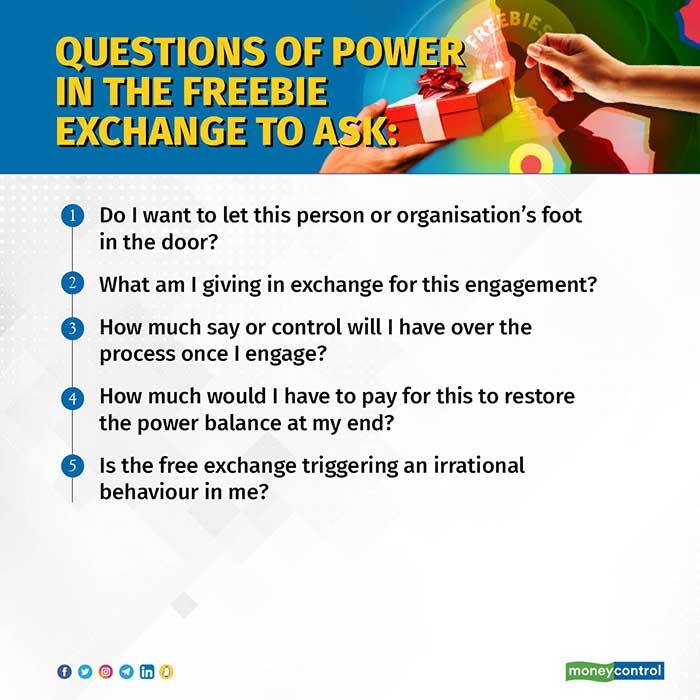



Note to readers: Healing Space is a weekly series that helps you dive into your mental health and take charge of your wellbeing through practical DIY self-care methods.
We all love free things, who doesn’t? However, things that are free are not entirely free. What do you mean, you may think, I got this thing entirely free and I’m perfectly happy not paying for it. Things that are free are simply not using money as currency. Their currency is power. In the power equation, the one who gives is leveraging their position of giving. They do this by triggering reciprocity. Anything that you have received free triggers an emotional response, a sense of obligation in you. The person who wields  the power may not capitalize on the reciprocity immediately, but eventually, you fall into the likeability trap. ‘Hey, this person gives me some free things, they can’t be all that bad’ you’re likely to think. It’s also why there is candy at reception counters where you pay.
the power may not capitalize on the reciprocity immediately, but eventually, you fall into the likeability trap. ‘Hey, this person gives me some free things, they can’t be all that bad’ you’re likely to think. It’s also why there is candy at reception counters where you pay.
Studies in marketing persuasiveness have shown free things build customer loyalty, an emotional stimulus of liking, and preferring over others, and often obligates people to take what they didn’t intend to take at all. Dan Ariely, behavioural economist at Duke University, and Kristina Shampanier co-authored a study that called out the zero-price effect: people tended to behave irrationally when they got things for free. You might not put yourself on a roller coaster on a regular day, but if it was a free ride, you’d give it a shot.
In interpersonal relationships, this also has a comparable effect. You’ve heard the concept of never doing business with family. Why? Because then you’re messing with a power equation. It’s not about the money. It’s about what the money says. The person who is always paying the bill becomes paternalistic, defaults to taking charge and believes they have a say in unrelated events. For instance, if your father is picking up the tab for your newest business enterprise, he is also probably giving you well-meaning advice which you may not actually want or find beneficial, but you become obligated to listen at least.
If a family member has loaned you the money to buy a house, or rented you a house at a much lower price than market rate, you may find them inviting themselves over when it is convenient to them and not to you. This is because the person isn’t getting anything back for their investment i.e. the principle of reciprocity has not been fulfilled. So, it is instinctive to reach out and grasp for some level of control.
A simple way to counter this and restore the power balance if you do need their investment or discount or favour is to arrange for some level of a return token. It could be a payment plan to return their money, or it could be a notional exchange, such as an equity stake in the company , or if it’s personal, a fixed meal together at a mutually agreed timeline. You can offer them whatever work or skill you can manage to do, such as filing their taxes or managing their investment portfolio for them or babysitting for them when they need it. Whatever you choose to do, have an equal reciprocity moving towards them to restore the balance.
Power is a delicate balance between friends and family. No matter how much the wealthiest guy in the group insists on paying the bills, a lack of reciprocity will eventually begin to grate on the relationship dynamic and some become the takers and others the givers. If you have to rearrange the weekly meet-ups to something that everyone can afford to contribute to in some way, that is going to keep your group intact for longer, so it is worth sacrificing a high-end bar and lounge for it.
Okay so you know why you wouldn’t take anything free, but it’s also that you should never offer to do any work for free. Even if you’re charging a token or honorarium, research shows that people value that which they have paid for.
Someone who has paid for a ticket is likely to show up for the show. Let’s say you’re the show organizer. The free tickets that you’re giving away can mean one of two things – clout and power or lack of value. For them to have clout and power, you would have to give them in very limited quantity to people more valuable than you. Again, you’re trading your power for their visibility by buying in a loyalty. They feel obliged to attend. You’re aware of what you are giving the tickets in return for. When you do free work for a company that has more power than you, you should be sure that you are receiving and need what they’re giving you in return. Companies claim that you should intern with them for free for exposure or work experience and references. But you would need to consider if that is valuable to you, where you would be able to trade that in reciprocally, and for what. Do remember that you are not gaining power by giving them your work free because they already hold the power in this equation. So, by giving them free work, how are you benefiting? To begin this way is to enter into an equation that disempowers you long term. If anything, it reduces your capacity to bargain in the future because you are now someone who has bought into the theory that you are not owed anything for your effort. You are now a willing pool of people who is content to contribute to a lopsided power equation where the powerful get more powerful.
Free anything is power. Before you accept or give anything for nothing in return, ask what you’re giving away or gaining by the process.

Discover the latest Business News, Sensex, and Nifty updates. Obtain Personal Finance insights, tax queries, and expert opinions on Moneycontrol or download the Moneycontrol App to stay updated!
Find the best of Al News in one place, specially curated for you every weekend.
Stay on top of the latest tech trends and biggest startup news.